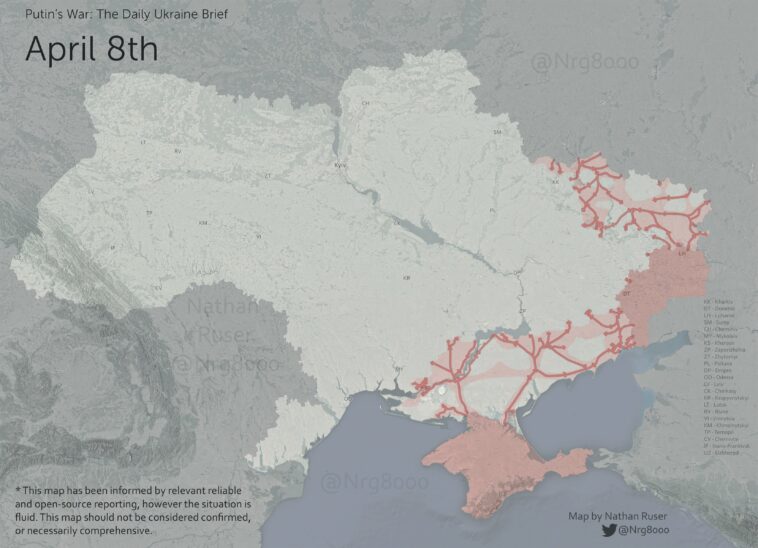Missile strike on Kramatorsk train station. On April 8, Russian forces hit the railway station in Kramatorsk with a Tochka-U missile with a cluster munitions warhead. At the station, nearly 4,000 people were waiting for evacuation trains. The Russian troops launched the missile from the occupied territory in Luhansk region.
Ukrainian President Volodymyr Zelenskyi called on the world for a harsh response. Unpunished evil will cause more suffering in the future, he said.
A preliminary report says at least 50 people were killed in Russia’s missile strike on the train station in Kramatorsk. “Five children among 50 people were killed as the Russian troops hit the Kramatorsk train station with a Tochka-U missile,” head of Donetsk regional administration Pavlo Kyrylenko said.
Ninety-eight people were taken to hospitals. “We expect more people to seek medical aid in the coming days, so the casualty toll will be changing,” he added.
Sixteen children, 46 women, and 36 men among the 98 injured that were taken to hospitals, Kyrylenko said. Twelve people died in hospitals. Thirty-eight people were immediately killed.
A missile that struck the station in Kramatorsk was possibly launched from the territories occupied by Russia, investigators of the Conflict Intelligence Team said.
In Chernihiv, 700 civilians killed since Russia’s invasion, city mayor Vladyslav Atroshenko said. Seventy of those killed have not been identified yet. Others were identified.
About 40 people are recorded as missing, Atroshenko said. Most likely, they were killed as many of them were last seen near buildings or vehicles destroyed by Russia’s attacks.
Between 80,000 and 95,000 people stay in the city. Pre-war, there were between 285,000 and 290,000 residents in Chernihiv.
It would take at least four years to rebuild Chernihiv that was heavily damaged by the Russian attacks, the mayor said.
European Commission President, EU Foreign Policy Chief, Slovak Prime Minister visit Bucha. President of the European Commission Ursula von der Leyen, EU’s High Representative for Foreign Affairs Josep Borrell, and Prime Minister of the Slovak Republic Eduard Heger visited Bucha, a site of massacre of hundreds. EU would allocate EUR 7.5 million to support investigation of the war crimes in Bucha and other Kyiv suburbs, an earlier report said.
The EU adopted the fifth round of sanctions against Russia. A ban on Russian coal will take full effect in August.
Slovakia donates S-300 system to Ukraine, responding to Ukraine’s appeal. Slovakia acted upon Article 51 of the UN Charter, allowing a nation to use self-defense.
Slovakia gave its S-300 air defense system to Ukraine, Prime Minister Heger said in a video address on Facebook recorded on the train to Kyiv. Slovakia did not become part of the armed conflict, he said.
“Defense of the Slovak Republic is secured. It will be reinforced by our allies’ air defense system in the coming days,” he added.
Ukraine in Flames #29. What does the defeat of Russia in Ukraine mean?
The first stage of a full-scale invasion of Ukraine by Russia did not achieve any significant results. Russia failed to achieve its goals in any strategic direction. Now the Kremlin is trying to regroup troops and launch a new massive offensive in the East and South of Ukraine. The systemic sanctions imposed by the US and the majority of European countries are already dealing a devastating blow to the Russian economy. Russia is threatened with default, as well as a complete shutdown of international operations. An inevitable economic and a possible political crisis awaits Russia. The world should consider how to deal with the fundamental change in the established geopolitical balance of power. We will discuss effective responses to these changes in Ukraine in Flames #29.
Speakers:
Iurii Syrotiuk, Director of the Non-Governmental Analytical Center “Ukrainian Studies of Strategic Disquisitions”
Iuriy Oliinyk, PhD in Political Science, Head of Research Programs of “Ukrainian Studies of Strategic Disquisitions” Non-Governmental Analytical Center
Andreas Umland, analyst of the Stockholm Center for Eastern European Studies of the Swedish Institute for International Affairs
Archil Tsyntsadze, military expert

